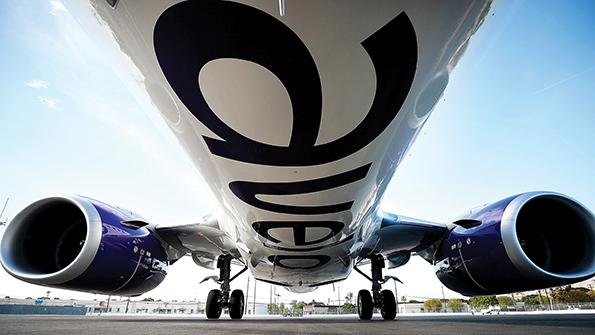
Avelo Airlines is hunting for pilots to help meet its growth targets, and competition is fierce—at least domestically.
To help meet its staffing needs, the U.S. startup has expanded its search to include foreign pilots from a variety of nations, made possible through a new partnership with Alliance Aviation, a Fort Lauderdale, Florida-based pilot training organization.
- Partnership with Alliance Aviation is helping to source international and domestic pilots
- Company plans to grow its fleet to 60 aircraft
- Few opportunities for larger carriers to hire outside U.S.
Announced July 21, the new initiative will allow Avelo to source from Alliance’s Preferred Referral Network of U.S. and international pilots who have completed the commercial pilot academy’s FAA Part 142-certificated training program.
Alliance, which has campuses across the U.S. as well as in Mexico and Colombia, offers training services across a host of popular mainline aircraft platforms including: the Airbus A320; Boeing 737, 757 and 767 families; and regional jets manufactured by ATR and Embraer.
Through its referral program, Alliance recommends first officer candidates who can then apply for possible EB-2 employment-based visas to fly commercially in the U.S. on behalf of Avelo and other participating carriers. The foreign pilots are intended to augment Avelo’s staff as it continues to hire domestic aviators.
A spokesman for Avelo says the company hopes that at least 20% of new pilots it hires over the next year will be referred through the Alliance partnership. The carrier, which launched scheduled service in May 2021, employs fewer than 100 pilots, according to the spokesman, but plans to hire as many as 160 over the next 12 months as it grows its fleet with additional used 737-700/-800 jets.
Alliance CEO Federico Navarro tells Aviation Week that the company has processed more than 250 pilots this year who have converted foreign licenses to FAA airline transport pilot licenses. “We’re talking about pilots with 10,000-15,000 hr. as a first officer with major carriers, so these are people who are exceptionally qualified,” Navarro says.
While it is actively seeking both domestic and foreign pilots, Avelo CEO Andrew Levy tells Aviation Week that the company is not facing a shortfall of available pilots, describing the ranks as “fully staffed with a bunch of folks that are still in the training pipeline.”
Levy emphasizes the “extremely competitive pay” on offer at Avelo, which he says is “not even that far” from what the legacies are offering new recruits. In January, the company elevated starting pay by 30% for first officers and 50% for captains. After five years of employment, a captain at Avelo can earn $220/hr., plus an $1,800 monthly stipend intended to offset commuting costs—in line with other much larger ultra-low-cost carriers (ULCC) like Frontier Airlines and Spirit Airlines.
Aside from the competitive pay, Levy highlights other perks of flying for an upstart carrier such as Avelo versus a legacy carrier or more established ULCC. Because the company is starting small with a fast rate of projected growth, first officers can advance more quickly from the right seat to the left seat. And Avelo’s out-and-back flying model means pilots can leave home in the morning and return that same night—a major perk that allows them to spend more time at home with their families.
Levy says the company’s startup ethos and hands-on culture serve as a draw for many prospective applicants, too.
“It’s fun to be in a startup environment where it’s small and people know your name,” Levy says. “We have an amazing esprit de corps that stems from our values and how we do things. All our senior leaders are executives, but they’re also doers. This is an environment where we check hierarchy at the door, and a lot of people really dig that.”
Avelo is looking to begin filling first officer openings in October. The carrier has a fleet of 10 737 Next Generation (NG) aircraft and has committed to grow to 14 by year-end. It does not have any commitments beyond that, but hopes to “grow well beyond 60 airplanes” over the next several years, Levy says.
The company employs 500 “crewmembers,” as Levy calls employees, but plans call to end 2022 with a staff of 700-800.
To be sure, Avelo is not the only U.S. airline that has expanded its hiring efforts to include foreign pilots. Carriers including Breeze Airways, Frontier Airlines and SkyWest Airlines have all taken advantage of the E-3 work visa program to hire pilots from Australia. The E-3 program specifically allows Australian citizens to work in the U.S. in some specialty occupations.
But it is very difficult for larger carriers to hire foreign nationals without running afoul of union contracts. Kit Darby, a former airline pilot who is now president of the eponymous Kit Darby Aviation Consulting, tells Aviation Week that there are “thousands” of foreign pilots who have applied to work in the U.S. using EB-2 national interest visas, which waive the normal requirement that an immigrant worker already have a job offer before entering the country. But he says that only a small percentage of applicants actually have been able to gain employment.
“There’s a secret reserve out there that no one is talking about,” Darby says. “There is a large supply of well-qualified and experienced international pilots who would love to immigrate to the [U.S.].”
For a startup like Avelo, which does not have to deal with organized labor—at least for now—looking outside the U.S. for pilots can offer a leg up on less nimble competitors that are restricted solely to domestic hires.
“There are fantastic pilots who are born in other countries, and some of them have the ability to come here pretty easily,” Levy says. “This was a good opportunity for us to expand the pilot hiring universe, which is something that’s important for us. And it’s going to be important for all U.S. airlines over the coming years.”






Comments